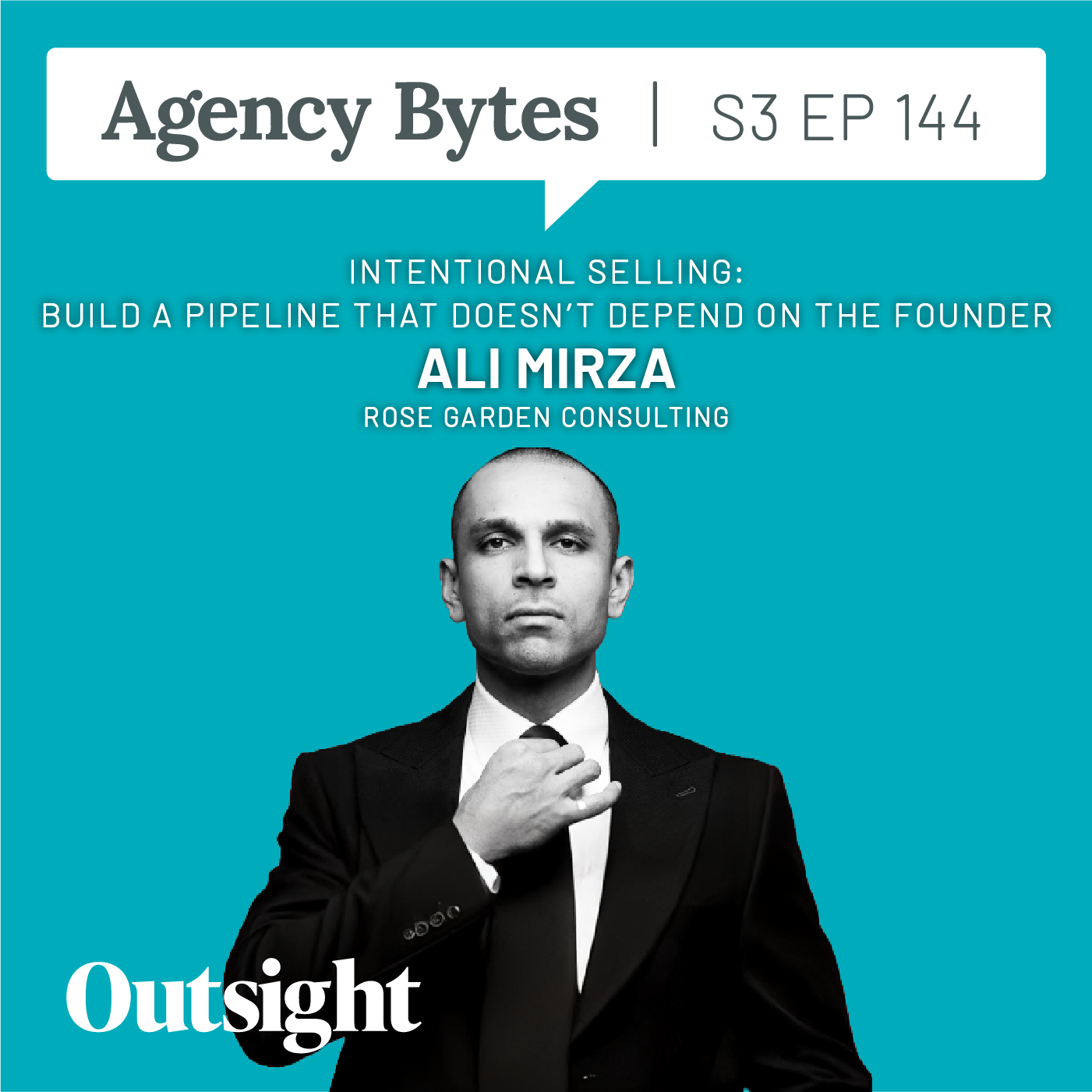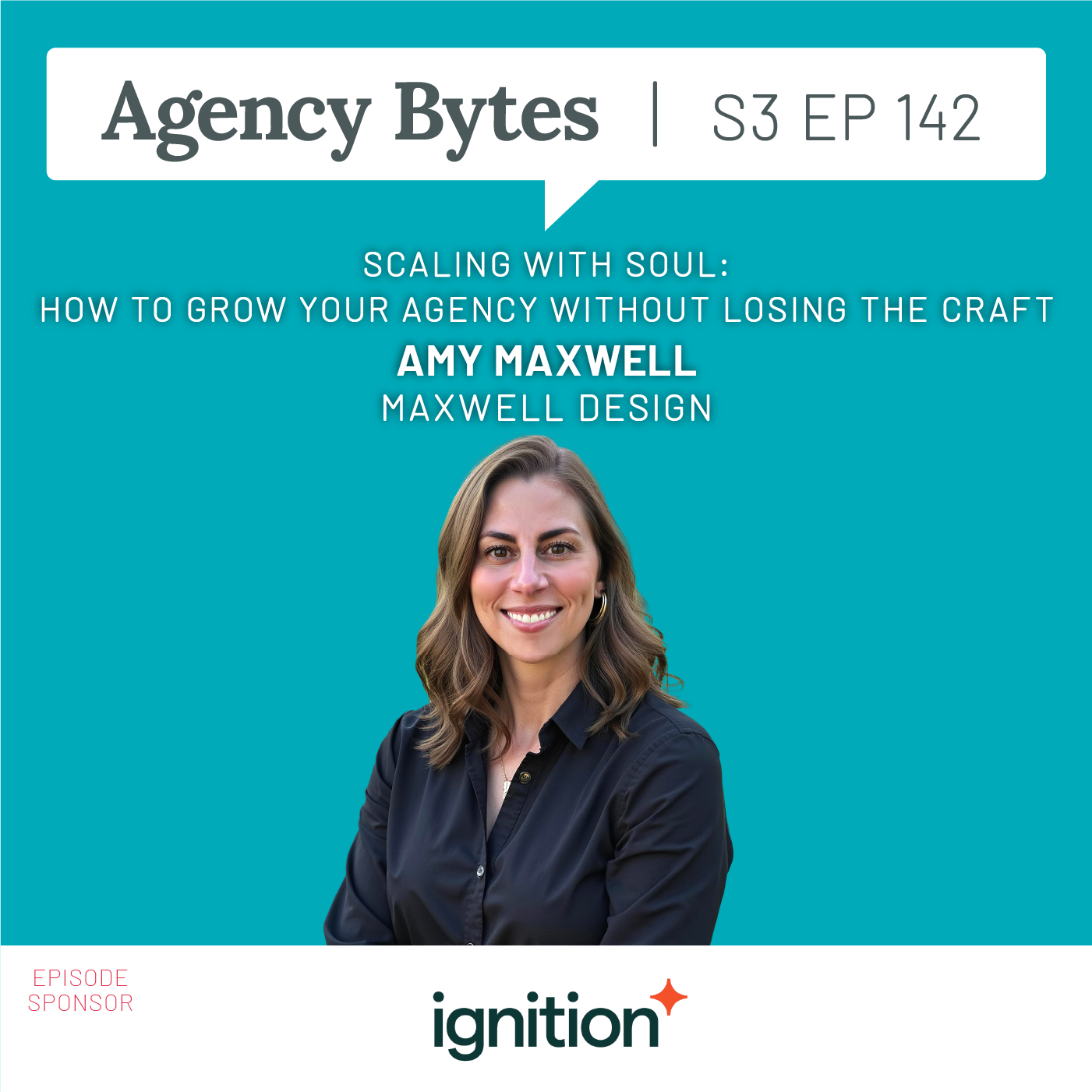Agency Bytes Podcast
Agency Bytes is a video podcast series that packs a ton of important agency information on one topic, from one expert into a 25-minute brief.
Why 25 minutes?
Because who has the attention span for much more these days, and you can squeeze in a listen between meetings with time for a bathroom break or coffee refill before your next meeting.
Agency Bytes is sponsored by
Easily find the episode you’re looking for with the Podcast Search feature - type in a guest name, topic, or episode number and voila!
Listen & subscribe on the platform of your choice
Subscribe for email delivery each week
Ep 144 – Ali Mirza, Rose Garden Consulting – Intentional Selling: Build a Pipeline That Doesn’t Depend on the Founder
In episode 144, I’m joined by Ali Mirza, a sales expert who’s personally closed over $450 million in revenue and advised hundreds of high-growth companies, including multiple Inc. 500 winners and successful exits.
Ali and I dig into what’s really broken in agency sales today — from why “more leads” isn’t the answer, to how founders unintentionally sabotage deals, to the mindset shifts required to close larger, more confident engagements. This conversation is especially relevant for agency owners who are great at delivery but feel stuck, uncomfortable, or inconsistent when it comes to selling.
We talk candidly about sales systems vs. sales personalities, the danger of winging it, and how agencies can move from reactive selling to intentional, scalable growth without becoming someone they’re not.
Key Bytes
• Why “just getting more leads” rarely fixes agency sales problems
• The hidden mindset traps that keep agency owners underpricing
• How confidence (not pressure) actually drives better close rates
• The difference between selling expertise vs. selling outcomes
• Why inconsistent sales processes hurt valuation and scalability
Chapters
00:00 Why agency sales feels harder than it should
04:32 The biggest sales myths agency owners believe
09:15 Why confidence matters more than scripts
14:40 Selling outcomes vs. selling services
20:05 How founders accidentally sabotage deals
26:18 Pricing fear and the psychology behind it
32:10 Building a repeatable sales process
38:45 What great agency sales leadership really looks like
44:20 Final advice for agency owners who hate selling
Ali Mirza is a sales expert who has personally closed over $450 million in sales with multiple Inc. 500 companies and high-growth startups.
His work has been featured in Inc., Forbes, Huffington Post, Business Insider, and more. He has consulted for hundreds of companies, with 17 earning the Inc. 500 Fastest Growing Companies award and three successfully acquired. He is president of Atlanta-based consulting firm, Rose Garden.
Connect with Ali:
IG: @alimirza.rgc
Ep 143 – Sharon Toerek, Legal and Creative – The Legal Blind Spots Costing Agencies Millions
THIS EPISODE IS SPONSORED BY IGNITION. START YOUR FREE 14 DAY TRIAL ignitionapp.info/agencybytes-trial Use Code OUTSIGHT25 to save 50% off!
In episode 143, I dig into one of the most underestimated risks in agency ownership: the legal blind spots that quietly cost agencies millions over time.
From contracts and scope creep to client disputes, IP ownership, and liability exposure, we unpack where agencies unknowingly put themselves at risk — and why most don’t realize it until it’s too late.
This conversation is a must-listen for agency owners who want to protect what they’ve built, reduce unnecessary exposure, and stop treating legal as an afterthought instead of a growth safeguard.
Key Bytes
• Most agencies don’t realize their biggest legal risks until a problem hits
• Poor contracts quietly drain profit long before lawsuits happen
• Scope creep is as much a legal issue as it is a pricing issue
• IP ownership mistakes can create long-term client and valuation problems
• Proactive legal structure is a growth advantage, not a cost center
Chapters
00:00 Why legal blind spots are so common in agencies
04:15 The contracts agencies rely on (and why they fall short)
10:20 Scope creep as a legal and financial issue
18:05 IP ownership mistakes that come back years later
26:40 Client disputes: where agencies expose themselves
34:10 Risk vs. fear: what actually matters legally
42:00 Simple fixes agency owners can make now
50:10 How legal hygiene protects valuation and exit
56:30 Final thoughts & wrap-up
Sharon Toerek is Founder of Toerek Law (doing business in the agency world as Legal + Creative), where she focuses her national law practice on helping advertising, marketing, communications and creative agencies protect their assets and turn their ideas into revenue.
Sharon provides proactive, strategic counsel to communications, marketing, advertising, digital and creative agencies on legal and business issues they face continually in their work, including:
• agency-client relationships, including agency service contracts
• agency-freelancer and agency strategic alliance relationship management
• trademark and copyright protection, enforcement and licensing
• influencer marketing negotiations and content marketing legal compliance
• advertising regulatory compliance
• AI policy and risk management for agencies
Sharon is an approved participant on the 4A's Legal Consultants Panel, and a member of the 4A’s Expert Network. She has also served as President of the American Ad Federation (AAF) Cleveland and has been elected to AAF Cleveland’s Hall of Fame.
In addition to her Firm’s work representing U.S. independent agencies, Sharon
• Created the Legal + Creative Agency Protection System, a comprehensive legal education and legal toolkit for marketing, ad and creative services agencies
• Created and hosted over 300 episodes of the agency-focused podcast The Innovative Agency, a podcast about innovation and trends in the marketing agency world
• Presents sessions on agency-critical legal topics to independent agency networks, to private agency audiences, and at industry conferences including INBOUND, Content Marketing World, MAICON, the Build a Better Agency Summit, Own It Summit, Mirren New York, and PRSA Counselors Academy.
Contact Sharon:
Ep 142 – Amy Maxwell, Maxwell Design – Scaling With Soul: How to Grow Your Agency Without Losing the Craft
THIS EPISODE IS SPONSORED BY IGNITION. START YOUR FREE 14 DAY TRIAL ignitionapp.info/agencybytes-trial Use Code OUTSIGHT25 to save 50% off!
In episode 142, I sit down with Amy Maxwell, founder and creative director of Maxwell Design, to talk about the real tension small creative shops face: how do you grow without sacrificing the craft that made you successful in the first place?
We dig into what it looks like to evolve from “hands-on designer” to “agency leader,” how to protect quality as you add capacity, and how to make smart choices about clients, process, and scope so growth doesn’t turn into chaos. If you want to scale with intention (and still love the work), this one’s for you.
Key Bytes
• Scaling doesn’t have to mean sacrificing creative quality
• Your process is what protects the craft as you grow
• “Better clients” often solves what “more clients” can’t
• You can stay hands-on without being the bottleneck
• The right constraints create consistency, not limitation
• Hiring should reduce friction, not add management drag
• Clear scope and boundaries prevent quiet burnout
Chapters
00:00 Intro: scaling without losing the craft
02:10 Amy’s origin story and building Maxwell Design
06:20 The “stay small” choice and what it protects
11:05 When growth starts to strain quality (warning signs)
16:10 Processes that keep creative standards high
22:30 Team structure: support roles vs creative roles
28:40 Client fit, boundaries, and saying “no” earlier
34:15 Staying fulfilled while the business grows
40:20 Rapid-fire questions and wrap-up
Amy—Creative Director + Founder of Maxwell Design—has spent the last two decades helping businesses look their best. She’s an award-winning designer with a knack for reading minds and creating delightful visual experiences. Her solution-focused approach makes her someone you’ll want in any room. And her small (but mighty) team comes with some major design chops.
Ep 141 – Meredith Fennessy Witts + Melissa Lohrer, Agency Darlings – Community Over Competition: How Agency Darlings Are Rewriting the Rules
THIS EPISODE IS SPONSORED BY IGNITION. START YOUR FREE 14 DAY TRIAL ignitionapp.info/agencybytes-trial Use Code OUTSIGHT25 to save 50% off!
In episode 141, I sit down with Melissa and Meredith, the hosts of the Agency Darlings podcast and longtime agency operators, to unpack why so many agency owners feel burned out, stuck, or disillusioned by the traditional agency growth advice that’s been circulating for decades.
We talk candidly about the “bro playbook” — hustle culture, ego-driven leadership, top-down decision making, and growth at all costs — and why it often leads to unhealthy teams, poor margins, and miserable owners. Melissa and Meredith share what they’ve learned from years inside agencies about what actually drives sustainable growth: emotional intelligence, clear communication, strong operations, and leadership that prioritizes people alongside profit.
This episode is a refreshing, grounded look at agency leadership through a more human lens — one that challenges outdated norms and offers agency owners permission to build businesses that align with who they actually are.
Key Bytes
• Why the traditional agency “bro playbook” is failing modern agencies• The hidden cost of hustle culture on owners and teams• How emotional intelligence impacts agency growth and retention• What healthier leadership looks like inside agencies• Redefining success beyond revenue and headcount
Chapters
00:00 Why the traditional agency playbook feels broken05:12 The origins of hustle culture in agencies11:04 Masculine-driven leadership norms and their impact17:32 Emotional intelligence as a growth lever23:58 Building healthier agency cultures30:41 Operator-led leadership vs. ego-led leadership37:10 Sustainable growth without burnout43:26 Redefining success as an agency owner49:12 Advice for owners ready to do things differently
Each with over 15 years of experience in the agency space and deep-rooted connections within the industry, Melissa and Meredith bring actionable insights, expert advice, and candid conversations that challenge the conventional, masculine-driven approaches to agency growth.
Contact Meredith & Melissa:www.agencydarlings.comhttps://bit.ly/MWDarlingshttps://waverlyave.comhttps://instagram.com/waverlyave.cohttps://www.lecheile.co/contacthttps://www.instagram.com/lecheile.co/
Ep 140 – Michael Janda, More Creative Academy – The Creative’s Guide to Growing Up: From Portfolio to Profits to Peace of Mind
THIS EPISODE IS SPONSORED BY IGNITION. START YOUR FREE 14 DAY TRIAL ignitionapp.info/agencybytes-trial Use Code OUTSIGHT25 to save 50% off!
In episode 140, I sit down with Michael Janda—agency founder, bestselling author, and one of the most respected voices helping creatives master the business side of creativity. Michael built and sold Riser, worked with giants like Disney and Google, and later led creative teams at Fox before dedicating his career to teaching creatives how to price, position, and run their businesses without burning out.
We dig into the mental and operational “growing up” that every creative eventually faces: getting past portfolio thinking, charging confidently, understanding value, eliminating chaos, and building a more peaceful (and profitable) creative life. Michael’s straight-talk wisdom hits every agency owner exactly where they need it—no fluff, no ego, just clarity.
Key Bytes
• Why creatives struggle with pricing — and how to fix it
• The mindset shift from freelancer to business owner
• How Michael positioned his agency to win massive clients
• The surprising relationship between process, profit, and peace
• What creatives get wrong about value
• Why “portfolio thinking” holds owners back
• How to build a business that supports your life, not the other way around
Chapters
00:01 Welcome + Michael’s background and agency journey
04:12 From creative chaos to building processes that scale
09:45 Why pricing is emotional—and how to make it objective
14:30 Portfolio vs. business owner mindset
19:58 Finding ideal clients and positioning that works
25:21 How Michael sold his agency and what he learned
31:44 The psychology of creative profitability
38:10 Achieving peace of mind as an owner
44:22 Michael’s advice for creatives who feel “stuck”
Michael Janda is an award-winning creative director, agency founder, and bestselling author.
He built the creative agency Riser with clients like Disney, Google, Warner Bros., and ABC, then sold the business after 13 successful years. Before that, he served as a creative director at Fox. Michael
is the author of Burn Your Portfolio and The Psychology of Graphic Design Pricing. Today, he shares practical, no-fluff strategies to help creative professionals master business, pricing, and growth.
Community: https://morecreativeacademy.com
Instagram: https://instagram.com/morejanda
YouTube: https://youtube.com/morejanda
LinkedIn: https://linkedin.com/in/morejanda
Website: https://michaeljanda.com
Courses: https://morejanda.teachable.com
Ep 122 – Arielle Cohen, Business 411 – Building Scalable Systems for a Multi-Seven Figure Agency
Ep 122 – Arielle Cohen, Business 411 – Building Scalable Systems for a Multi-Seven Figure Agency
In episode 122, I sit down with Ariel Cohn, founder of Marketing 411 and CMO of Business 401, to talk about how she scaled a multi–seven figure agency by going all-in on the roofing niche. Ariel shares why niching transformed their operations, how they built scalable systems and sister companies to serve the industry, and why embracing AI and virtual teams has been key to their growth. We also dive into the mindset shifts required to build an agency that supports your lifestyle — instead of running you into the ground.
Key Bytes
• Niching down creates clarity, repeatable systems, and faster scaling opportunities
• A sister company approach can build trust and open new revenue streams
• Retainer-based models help stabilize cash flow and increase profitability
• Virtual teams and offshore talent can boost efficiency without sacrificing quality
• Embracing AI is no longer optional — it’s essential for agency survival and growth
Chapters
00:01 Intro and Ariel’s background in roofing marketing
01:12 From generalist to roofing specialist: why niching was key
04:44 Myths about niching and lessons from going all-in
07:32 Defining the ideal client profile and setting minimums
09:00 Early challenges and focusing on revenue first
12:34 Building two complementary companies for growth
16:22 Leveraging virtual teams, overseas talent, and AI for scale
19:07 Retainer models vs. one-off projects for stable growth
20:29 Staying hungry and setting bigger goals
23:18 Embracing AI and adapting to industry change
25:10 Rapid fire: worst advice, daily habits, and explaining her job to a 5-year-old
Arielle Cohen is the Co-Founder of Marketing 411 and CMO of Business 411. With over a decade of experience in marketing, she has mastered the art of growing a Multi 7 Figure Agency through building a scalable and efficient operation. As the company grows, her focus has shifted to optimizing her time and building a dream company that supports her vision and lifestyle—without letting the business take over.
Social: @arielleCEO
Ep 121 – Shawn Johnston, Forge & Smith – Profitable by Design: Streamlining Dev Without Cutting Corners
Ep 121 – Shawn Johnston, Forge and Smith – Profitable by Design: Streamlining Dev Without Cutting Corners
In episode 121, I sit down with Shawn Johnston, founder of Forge and Smith and creator of Refoundry—a low-code WordPress platform that’s transforming how agencies build and deliver websites. We talk about how Shawn cut delivery time by 70%, turned profit margins around using the Profit First method, and transitioned his agency toward a scalable, productized model. He shares insights on navigating developer pushback, balancing client empowerment with agency control, and preparing for evolving tech shifts like AI in web development. Whether you’re struggling with project bottlenecks, shrinking budgets, or scaling challenges, Shawn’s story offers a clear path forward for building smarter, more profitable systems.
Key Bytes• Refoundry cut Forge and Smith’s development time by 70%, transforming profitability.
• Adopting Profit First changed their approach to pricing and overhead limits.
• Client empowerment through low-code builds loyalty and drives referrals.
• Transitioning leadership allowed Shawn’s team to grow into bigger roles.
• Technological shifts (like Webflow and AI) demand constant agency adaptation.
• Productizing an internal tool opened new revenue streams beyond services.
• Balancing developer pride with client needs is critical for successful adoption.
• Early lessons in print taught Shawn to anticipate and embrace industry change.
Chapters00:01 Introduction to Shawn Johnston and Forge and Smith
02:11 Moving from freelance to full agency and early challenges
04:39 Implementing Profit First and shifting to scalable systems
06:38 Why Refoundry: Bringing low-code to WordPress
08:22 Cutting development time and improving project profitability
11:23 Developer pushback and prioritizing client empowerment
14:44 Evolving Refoundry into a product for other agencies
17:03 Transitioning leadership and building team collaboration
24:17 Preparing for tech shifts like AI and staying nimble in delivery
28:30 Rapid fire questions and final reflections
Shawn Johnston is the founder of Forge and Smith, a digital agency that’s launched over 500 websites in the past 13 years. After hitting the usual delivery bottlenecks and burnout cycles, he built Refoundry—a low-code platform for WordPress that helped his team cut build times by 70% and scale without sacrificing quality. Now he’s on a mission to help other agencies streamline delivery, boost margins, and build systems that actually work.
Contact Shawn:
Ep 120 – Greg Bellinger, White Rabbit – What Happens When You Niche Hard and Go All In
In episode 120, I sit down with Greg Bellinger, co-founder and CEO of White Rabbit, a web and mobile development agency with nearly 100 in-house employees spread across Colombia, India, and the U.S. Greg shares his journey from frontend developer to visionary CEO and breaks down how White Rabbit scaled by staying focused on one niche—supporting other agencies.
We explore why White Rabbit only hires full-time employees, how niching into agency delivery gave them a competitive edge, and the strategic thinking behind launching their own internal project financial software. Greg also talks about his passion for creation, not just in code but in culture, leadership, and future products. This one’s full of takeaways for agency owners looking to scale with purpose.
Key Bytes
• Greg shares why they only hire full-time employees and the cultural benefits that come with it
• He explains how niching into working with agencies helped them scale more efficiently
• Greg reflects on stepping away from product management and letting his leadership team shine
• He talks about the challenges of managing across three countries and how they keep their culture unified
• Greg reveals details about their custom-built project management and financial tool
• He offers insight into people management, tough conversations, and protecting your energy
• He shares his personal philosophy of “create,” from coding to building culture
• Greg discusses what entrepreneurship means to him and how it’s been part of his DNA from the start
Chapters
00:00 Welcome and guest intro
01:00 The origin of White Rabbit and its full-time hiring philosophy
02:30 Transitioning out of coding and project management
06:00 Working exclusively with agencies vs. going direct
07:15 Niching and its impact on growth and clarity
10:00 Scaling globally: why Colombia, India, and the U.S.
12:00 Uniting culture across three countries
14:00 Vision for the future: stepping back, launching products
16:30 Building internal software for project and financial management
19:00 Lessons in people management and entrepreneurship
25:00 Rapid fire: guilty pleasures, two-word advice, and dream hire
Greg Bellinger is the Co-Founder and CEO of White Rabbit Group, a web and mobile development agency with a fully in-house team of nearly 100 employees across three countries. His passion for technology began in childhood, leading him to hand-code his first websites in 2008. In 2016, he co-founded White Rabbit Group, building it into a trusted development partner for world-class agencies and creatives. Under his leadership, the company has earned a reputation for delivering high-quality digital solutions while fostering a close culture of technical experts.
Contact Greg:
Ep 119 – Jessica Malnik – Building Your B2B Content Moat
In episode 119, I sit down with Jessica Malnik, a B2B messaging strategist who’s helped over 75 founders and lean marketing teams craft content that actually gets read—and drives results. We talk about the risks of over-commoditized content in the age of AI and why a flood of “cheap” output isn’t a strategy. Jessica walks me through her signature framework, the Marketing MOAT, which focuses on Messaging, Distribution, and Content Efficiency.
She also shares practical, low-lift ways agencies can build content machines, maximize existing assets, and stay consistent without burning out. We even talk about content imposter syndrome, the curse of knowledge, and why you don’t have to be totally unique—you just need to show up as yourself.
If you’ve ever struggled with creating content that converts (and keeps converting), this episode is packed with clarity, systems, and smart takes that’ll help you raise your signal-to-noise ratio.
Key Bytes
• Messaging without a unique perspective leads to content that gets ignored
• AI-only content creation can dilute your brand and commoditize your services
• Her “Marketing MOAT” framework focuses on messaging, distribution, and content efficiency
• Distribution must be built into strategy from the beginning, not as an afterthought
• Agencies should reuse and repurpose evergreen content instead of always creating new
• Consistency (3x/week on LinkedIn) matters more than frequency spikes
• Authenticity in content doesn’t mean oversharing—it means resonance
• Set goals based on team size, budget, and business stage, then reverse engineer your strategy
Chapters
00:01 Welcome and intro to Jessica Malnik
01:46 Common agency messaging mistakes
03:26 Why AI-only content is risky for agencies
05:14 Jessica’s Marketing MOAT framework explained
07:21 How to develop “spiky” messaging and content positioning
10:34 Distribution strategy: where your audience actually is
14:04 Own your content—don’t rely only on social algorithms
15:09 Content efficiency and repurposing systems
19:00 Best practices for publishing frequency
21:16 Balancing personal and professional content
22:28 Reverse engineering content strategy based on goals
23:41 Rapid Fire Q&A with Jessica
Jessica Malnik has helped over 75 B2B founders and lean marketing teams fix their positioning and craft messaging people actually read and respond to.
I’ve spoken at half a dozen in-person conferences in the U.S., Australia, and Thailand, as well as dozens of virtual webinars, workshops, and podcast guest appearances.
I’ve also been featured in WSJ, The Next Web, MicroConf, Wynter, SXSW, and MSN UK, among many others.
Contact Jessica:
Ep 118 – Jamie Brindle – From Freelancer to Entrelancer: Building a Business That Scales
Ep 118 – Jamie Brindle – From Freelancer to Entrelancer: Building a Business That Scales
In episode 118, I’m joined by Jamie Brindle—a freelancer, strategist, and creator who’s built a half-million-strong audience around helping creative solopreneurs build sustainable, scalable freelance businesses. In this conversation, Jamie breaks down what it means to be an “Entrelancer”—a hybrid of entrepreneur and freelancer—and why the traditional view of freelancing is overdue for a reboot.
We talk about why having an audience builds instant trust, how freelancers can evolve into business owners without employees, and the myths around websites and portfolios that keep too many creatives stuck in planning mode instead of taking action. Jamie also shares a powerful framework for moving strangers into long-term client relationships—and why every freelancer should be thinking like a strategist, not just a task-taker.
Whether you’re freelancing, running an agency, or somewhere in between, this one’s packed with fresh thinking.
Key Bytes
• Jamie shares the origin of the term “Entrelancer”—and how it reflects a more modern, business-minded freelancer.
• He explains how their TikTok content (originally not for clients) unexpectedly opened doors to Fortune 100 opportunities.
• We dig into the importance of digital products, productized services, and building systems to support time freedom.
• Jamie outlines the four stages of the customer journey: Stranger → Lead → Client → Client for Life.
• He gives a masterclass in how to manufacture delight, over-deliver, and secure repeat work.
• We challenge the sacred cows of freelancer websites and portfolios—and why Jamie believes they’re massive time-wasters.
• Sales anxiety? Jamie offers a grounded, simple mindset shift that removes pressure and focuses on being helpful.
• He explains how positioning yourself as a solution—not a task-taker—is the unlock to charging more and building authority.
Chapters
00:00 Welcome and Intro to Jamie Brindle
01:00 The accidental power of TikTok and building trust
04:30 Redefining success as a freelancer
07:00 “Entrelancer” vs. freelancer: What’s the difference?
11:40 Scaling without employees: Productized and digital offers
13:00 Pivoting from video work to social media consulting
15:25 Lessons from shifting services and getting back in the field
19:30 Jamie’s four stages of the customer journey
24:00 Reframing sales: It’s just solving a problem
28:00 Positioning yourself as a strategic partner
34:00 Why portfolios and websites are the biggest time wasters
37:00 Final thoughts and closing
Jamie Brindle is a freelancer who gives advice to over half a million other creatives on social media about building a scalable and sustainable freelance business.
Contact Jamie:
@thejamiebrindle on all socials











